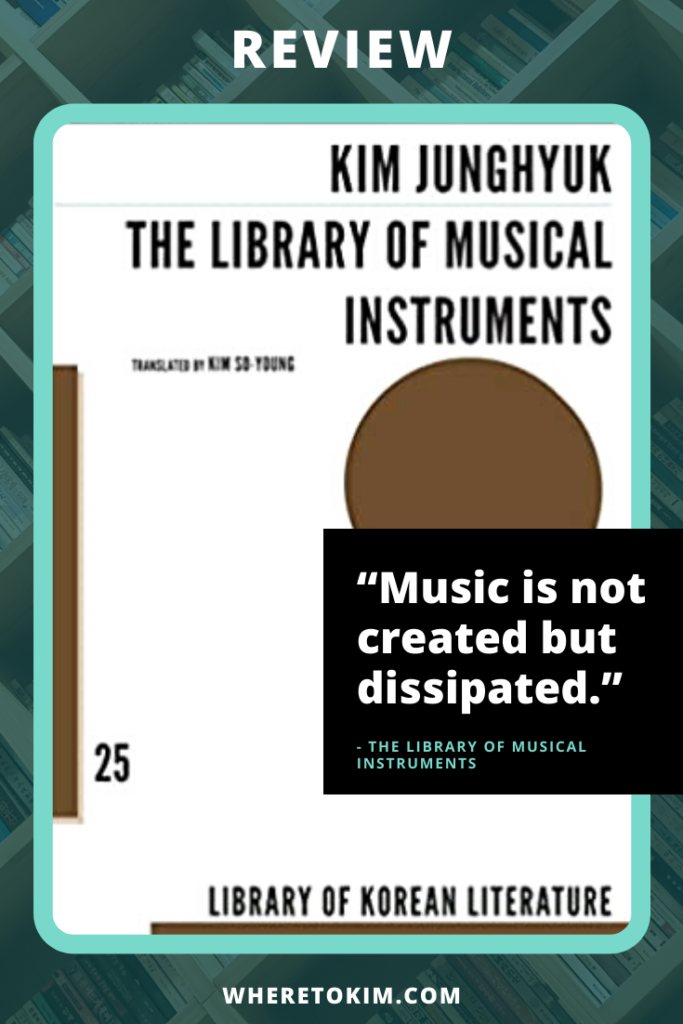The Library of Musical Instruments by Kim Junghuyk draws attention to the need for purity and passion over harmony and utility by stripping sounds and actions to their core.
The Library of Musical Instruments synopsis
The second short-story collection by Kim Jung-hyuk features a total of eight short stories, including Syncopation D which won the 2nd Kim You-jeong Literary Award in 2008. They represent the many sounds sampled by the author when he recorded over 600 kinds of musical instruments. Like instruments coming together in a symphony, the stories combine to make an opus consisting of variations on a theme. While the stories begin in an upbeat fashion and work to a crescendo, they end with notes in a minor key filling the vacuum. The Library of Musical Instruments is a collection to contemplate on more than one occasion.
Book review
It matters where you listen to music, whether it’s in a music store, (locked in) a basement, a concert hall or over the phone. The environment adds to the sensation and if you don’t see the artist, your experience is stripped down to its very core; as it was always meant to be.
A library of manuals
At the music store in the story The Library of Musical Instruments, the new employee approaches music and instruments in a highly theoretical and organizational way. He is not the only one. In each story in this book, the characters do interesting new things despite the fact that they initially don’t know where their passion and interests come from and assume that their passion is not useful or interesting to anyone but themselves. Still, they try to find a need, such as a library for musical instruments in the title story or a magazine of manuals in Manual Generation. Who would have thought that more than one person could be moved by a manual about a music player that connects you to every corner of the earth.
Manic or maniac
People’s strong feelings for music, passions or unexplained habits connect the stories. Glass Shield shows that not everything is as sophisticated as others perceive it to be. The esteemed pianist in Automatic Piano enjoys listening to live music over the phone, and argues that the pianist’s role is to use his body to dissipate existing sounds into the world, in the same way that you only transmit the sounds produced by the vibration of your vocal cords when you speak. He believes that artists should be transparent in reproducing notes without interpreting or analyzing them like an artist, by lending their bodies to art.
This leads to some interesting thoughts, such as whether the human being or the sound is in the lead. And whether a song that almost plays itself is as automatic as a robot or rather haunted? Should such a song be considered a pure representation or a soulless work of art if the human artist does not interfere with anyone listening to the core of the music? Automatic Piano is a melodic story that discusses the need for purity over harmony.
Recommendation
While the above sounds interesting – and I do find the very core of the stories interesting – the collection falls short in its execution. The stories lack something essential, namely a beat that is in sync with my heartbeat and touches the strings of my heart. The phrases and comparisons, the descriptions of flow and passion sound nice, but they don’t excite me. I am indifferent when I think “what a nice paragraph” or “what a nicely worded sentence”. The passions of the main characters are not conveyed to the reader. Instead, the stories are delicately written with tight direction, locking the passion and strong opinions inside the book and outside my heart.
I cannot recommend The Library of Musical Instruments. There are many better Korean short story collections out there.
Interested?
Get your copy of The Library of Musical Instruments from Amazon.
Book details
Title: The Library of Musical Instruments
Author: Kim Junghuyk
Translator (from Korean): Kim Soyoung
Language: English
Publisher: Dalkey Archive Press
Pages: 230
ISBN (13): 9781628971514
Publication date: 23 November 2016
About the author and translator
Born in 1971 in Kimcheon, a southeastern city of South Korea, Kim Junghyuk graduated from the Department of Korean Language and Literature at Keimyung University. He debuted as a writer in 2000 when his novelette “Penguin News” was published in the Literature and Society magazine.
Kim Soyoung is a professional translator with over a decade of experience and a master’s degree in translation and consecutive interpretation. She is currently focused on translating Korean books (fiction or nonfiction) into English.







